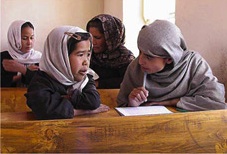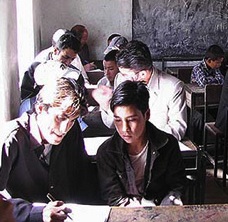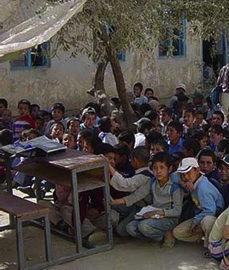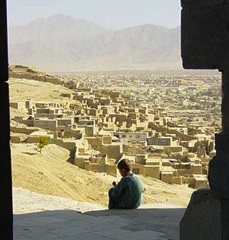In February 2005 vivo had trained a group of 32 local counsellors in the concepts of Traumatic Stress, PTSD and Narrative Exposure Therapy for traumatized survivors of the war and Taliban regime in Afghanistan. In October, a vivo team came back to Kabul and, together with the previously trained counsellors, carried out an epidemiological survey in schools in Dachti Barchi area of Afghanistan’s capital.
The study was realized in joined collaboration with GTZ (German Technical Cooperation) and CARITAS international. A total of 287 school children (122 girls) aged 7 to 14 participated in the screening. The focus of diagnostic interviews was on traumatic life experiences due to war and violence in a post-conflict society but also on stressful experiences related to domestic violence. Further areas of investigation were child labour, substance abuse in children and parents, physical wellbeing and psychiatric problems other than trauma in children.
Survey results indicate a rather high exposure of Afghan school children to stressful and traumatic experiences with particularly family violence being a core stressor. Overall, boys seem to be more affected than girls. Boys reported a higher number of war related events, domestic violence incidents and traumatic life experiences as well as a greater amount of somatic complaints, compared to girls. The especially bad condition of boys was also reflected in an extremely elevated PTSD prevalence rate with 26% of the boys being diagnosed with PTSD compared to 14% of the girls.
Furthermore, rates of child labour were very high. Half of the boys and nearly a third of the interviewed girls had to work on average seven hours a day, mostly in carpet weaving. Child labour was found to be significantly linked to family poverty, poor physical health, elevated exposure to domestic violence, and also to PTSD diagnosis [link to related publication] .
In summary, our findings call for urgent treatment of children affected by war, domestic violence and aversive life conditions such as child labour. Interventions should, however, be comprehensive and include psychotherapy for children who suffer from PTSD as well as urgently address issues such as child labour, domestic violence, poor school facilities and parental poverty. A first brief survey that also looked into the state of mental health in teachers showed that this particular adult population has been even more affected by traumatic events during the past decades of conflict in the country. Teachers presented with high rates of trauma exposure and reported numerous health problems and mental distress related. Planned activities must include support for teachers, since they constitute key players in the children’s immediate social environment.
In a final meeting vivo, GTZ and CARITAS presented the results of the survey to the local Ministry of Education in Kabul as well as selected guests from the local and international community and humanitarian assistances programs, inviting a discussion on the consequences for treatment and providing first suggestions for a school-based psychosocial intervention programme to be carried out in the future.
In February 2005 vivo had trained a group of 32 local counsellors in the concepts of Traumatic Stress, PTSD and Narrative Exposure Therapy for traumatized survivors of the war and Taliban regime in Afghanistan. In October, a vivo team came back to Kabul and, together with the previously trained counsellors, carried out an epidemiological survey in schools in Dachti Barchi area of Afghanistan’s capital.
The study was realized in joined collaboration with GTZ (German Technical Cooperation) and CARITAS international. A total of 287 school children (122 girls) aged 7 to 14 participated in the screening. The focus of diagnostic interviews was on traumatic life experiences due to war and violence in a post-conflict society but also on stressful experiences related to domestic violence. Further areas of investigation were child labour, substance abuse in children and parents, physical wellbeing and psychiatric problems other than trauma in children.
Survey results indicate a rather high exposure of Afghan school children to stressful and traumatic experiences with particularly family violence being a core stressor. Overall, boys seem to be more affected than girls. Boys reported a higher number of war related events, domestic violence incidents and traumatic life experiences as well as a greater amount of somatic complaints, compared to girls. The especially bad condition of boys was also reflected in an extremely elevated PTSD prevalence rate with 26% of the boys being diagnosed with PTSD compared to 14% of the girls.
Furthermore, rates of child labour were very high. Half of the boys and nearly a third of the interviewed girls had to work on average seven hours a day, mostly in carpet weaving. Child labour was found to be significantly linked to family poverty, poor physical health, elevated exposure to domestic violence, and also to PTSD diagnosis [link to related publication] .
In summary, our findings call for urgent treatment of children affected by war, domestic violence and aversive life conditions such as child labour. Interventions should, however, be comprehensive and include psychotherapy for children who suffer from PTSD as well as urgently address issues such as child labour, domestic violence, poor school facilities and parental poverty. A first brief survey that also looked into the state of mental health in teachers showed that this particular adult population has been even more affected by traumatic events during the past decades of conflict in the country. Teachers presented with high rates of trauma exposure and reported numerous health problems and mental distress related. Planned activities must include support for teachers, since they constitute key players in the children’s immediate social environment.
In a final meeting vivo, GTZ and CARITAS presented the results of the survey to the local Ministry of Education in Kabul as well as selected guests from the local and international community and humanitarian assistances programs, inviting a discussion on the consequences for treatment and providing first suggestions for a school-based psychosocial intervention programme to be carried out in the future.





